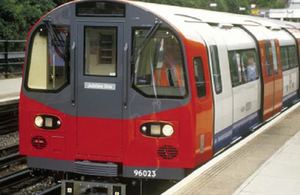Report 06/2019: Train travelling with doors open on the Jubilee line
RAIB has today released its report into a train travelling with doors open on the Jubilee line, 1 September 2018.

Image of Jubilee line train (not train involved in incident)
Summary
Shortly after 09:00 hrs on Saturday 1 September 2018, a London Underground Jubilee line train travelled between Finchley Road and West Hampstead stations with doors open at ten passenger doorways. The train, with approximately 30 passengers on board, reached a maximum speed of 62 km/h during the 56 second journey between the two stations. No-one fell out of the train and nobody was injured.
When the train stopped at Finchley Road station, some of the doors on the train, which was operating in automatic train operation mode (ATO), opened without being commanded to do so by the train operator. The operator’s controls did not allow him to open any doors, nor close any doors. It is likely that the door behaviour was due to control system overload caused by faults elsewhere on the train. While dealing with the door issue, the train operator operated a switch, bypassing the door interlock circuit that was intended to prevent the train departing with doors open. He then did not notice that some doors remained open when departing from Finchley Road station and travelling to West Hampstead. The train operator’s actions were probably influenced by:
- a sudden increase in his workload from the low level associated with automatic train operation
- fatigue from his sleeping pattern; and/or
- low blood-sugar levels from a prolonged period without food
An underlying factor was that, unlike some other London Underground trains and contrary to London Underground standards, the type of train involved in the incident could be driven with the door interlock circuit bypassed without an audible warning being provided to the train operator. A possible underlying factor was that the training of train operators did not adequately prepare them to manage the sudden increase in workload caused by the need to deal with faults, under time pressure, on trains operating in automatic mode.
Recommendations
The RAIB has made four recommendations addressed to London Underground. These include improvements to door control systems on Jubilee line trains; better training to help train operators respond correctly when sudden increases in workload occur while operating trains in automatic mode; raising train operator awareness of the adverse effects on safety from insufficient sleep and inappropriate eating patterns; and improved management of train faults.
The investigation also identified three learning points relating to the incident. These concern making sure that training, rules and procedures highlight the safety implications of operating sealed switches; understanding that careful checking that the correct switch has been operated when attempting to rectify technical faults is more important than timekeeping; and the importance of staff managing their work/life balance so that safety performance is not adversely affected.
Simon French, Chief Inspector of Rail Accidents said:
This very unusual incident highlights the stresses which Underground train operators can be subject to when something goes wrong. A technical fault which developed suddenly and without warning created a situation which the train operator had never encountered before. His attempts to solve the problem led him to isolate a safety circuit and move off without checking that the train doors were properly closed. In fact, ten sets of doors along one side of the train were wide open as the train ran the full distance to the next station. It is fortunate that there was no-one close to the doors at the time.
The rise of automatic operation has greatly improved the reliability of train services, but it has reduced the amount of engagement the train operator has with the on-train systems and equipment, which have become ever more complex. It is rare that an operator has to deal with a technical problem in service and understandable that, as in this case, they may sometimes be unsure of what steps to take. It is therefore important that operators are given the best possible training, and that the effectiveness of their response to problems is assessed as part of the company’s competence management system.
We are recommending that London Underground improves the training given to operators, and we think it is particularly important that they get the chance to practise responding to technical faults in a simulated train cab environment. This kind of training has been standard for airline pilots for many years, and I believe that it is time that it was more widely used in the railway industry.
Notes to editors
- The sole purpose of RAIB investigations is to prevent future accidents and incidents and improve railway safety. RAIB does not establish blame, liability or carry out prosecutions.
- RAIB operates, as far as possible, in an open and transparent manner. While our investigations are completely independent of the railway industry, we do maintain close liaison with railway companies and if we discover matters that may affect the safety of the railway, we make sure that information about them is circulated to the right people as soon as possible, and certainly long before publication of our final report.
- For media enquiries, please call 01932 440015.